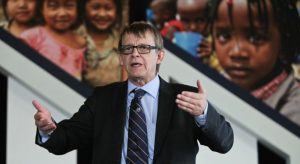Alex Standish in Sp!ked:
 Hans Rosling, who died last year, was a remarkable man. As a doctor, he practised and lectured in his home country of Sweden, and also worked in Mozambique, Tanzania, the Congo, Mexico, Cuba and India. His commitment to the medical cause was such that, in 2014, when the ebola epidemic broke out in West Africa, he headed to Liberia to help contain it. At the same time, Rosling was also engaged in another long-term project, aimed at reducing the gap between how people in the West perceive the rest of the world and its reality. Factfulness, written with his son Ola Rosling and daughter-in-law Anna Rönnlund, is part of this project (alongside the online resource Gapminder). Its aim is to enlighten those with a ‘completely outdated idea about the rest of the world’.
Hans Rosling, who died last year, was a remarkable man. As a doctor, he practised and lectured in his home country of Sweden, and also worked in Mozambique, Tanzania, the Congo, Mexico, Cuba and India. His commitment to the medical cause was such that, in 2014, when the ebola epidemic broke out in West Africa, he headed to Liberia to help contain it. At the same time, Rosling was also engaged in another long-term project, aimed at reducing the gap between how people in the West perceive the rest of the world and its reality. Factfulness, written with his son Ola Rosling and daughter-in-law Anna Rönnlund, is part of this project (alongside the online resource Gapminder). Its aim is to enlighten those with a ‘completely outdated idea about the rest of the world’.
…Factfulness makes for a refreshingly positive take on change and modernisation. And alongside the stats and data, Rosling also uses personal anecdotes to make his case for the importance of development. He recalls the day his family brought their first washing machine in 1960s Sweden: his grandmother so mesmerised by it that she pulled up a chair to watch the entire wash cycle. His mother told him, ‘The machine will do the work. So now we can go to the library.’ This book takes issue with those who think developing nations should not aspire to Western levels of consumption because of fears about global warming. Rosling once stood up to environmentalist and former US vice president Al Gore about this, when they met backstage at a TED conference in Los Angeles: Gore urged Rosling to use his statistical models to show a worst-case global-warming scenario, ‘to create fear’. But Rosling refused, saying that spreading fear tends to generate reactionary and ill-considered responses, and erodes trust in those who spread such fear.
He never dismissed the idea of global warming. Indeed, he identified it as one of five potential global problems we all should be worried about (the others being poverty, war, financial collapse and a global pandemic). But where environmentalists argue that the answer to climate change is to slow development, he said the opposite: ‘We must put our efforts into inventing new technologies that will enable 11 billion people to live the life that we should expect all of them to strive for.’
More here.
